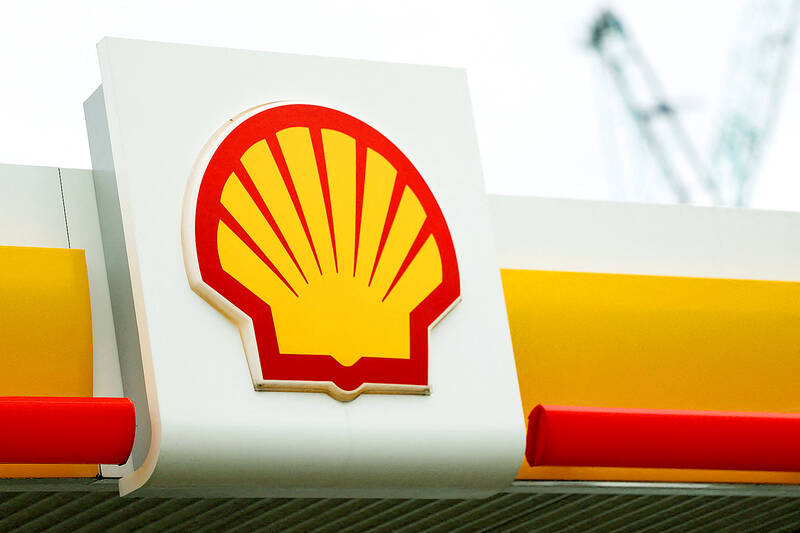Shell PLC plans to increase its dividend 15 percent and boost natural gas production as new CEO Wael Sawan refocuses on the fossil fuels that drove record profits last year.
It is part of a pivot by the European oil major to expand the most profitable parts of its business, even if they are carbon intensive, while scaling back ventures that do not make high enough returns.
The company reiterated its pledge to achieve net zero emissions by 2050.

Photo: Reuters
“We will invest in the models that work — those with the highest returns that play to our strengths,” Sawan said in a statement.
The management team was scheduled to lay out more details of the plan to shareholders at a presentation in New York yesterday.
The company has been gradually building back its dividend since former Shell CEO Ben van Beurden cut it during the depths of the COVID-19 pandemic. While the latest increase would still leave the payout about 30 percent below pre-pandemic levels, the move might help convince investors that the company can be a reliable source of cash, like its more highly valued US peers.
As well as the dividend increase, which would take effect this quarter, Shell committed to buying back at least US$5 billion of shares in the second half of this year. The company would reduce capital spending to US$22 billion to US$25 billion a year for next year and 2025, down from an expectation of US$23 billion to US$27 billion this year.
Key to achieving higher returns would be the oil and gas business that drives the majority of Shell’s profits. The company would no longer seek to cut oil production by 1 to 2 percent annually, having achieved its initial output-reduction plan — announced in 2021 amid a focus on cutting carbon emissions — faster than anticipated.
Shell aims to grow its integrated gas business and is to stabilize oil output to 2030. That follows in the footsteps of BP PLC, which also rolled back its plans to cut oil production earlier this year.
The initial outline of Shell’s plan puts oil and gas front and center while giving lower-return, low-carbon efforts a smaller supporting role. That is in stark contrast from the company’s strategy update about two years ago, when Shell said its oil production was in decline and named electricity and low-carbon hydrogen as its key sources of growth.
Shell said it is to invest “selectively” in power, focusing on markets where it can add value with its traders.
Investments in hydrogen and carbon capture technology would be made “in a disciplined manner to create options for the future,” it said.

POWERING UP: PSUs for AI servers made up about 50% of Delta’s total server PSU revenue during the first three quarters of last year, the company said Power supply and electronic components maker Delta Electronics Inc (台達電) reported record-high revenue of NT$161.61 billion (US$5.11 billion) for last quarter and said it remains positive about this quarter. Last quarter’s figure was up 7.6 percent from the previous quarter and 41.51 percent higher than a year earlier, and largely in line with Yuanta Securities Investment Consulting Co’s (元大投顧) forecast of NT$160 billion. Delta’s annual revenue last year rose 31.76 percent year-on-year to NT$554.89 billion, also a record high for the company. Its strong performance reflected continued demand for high-performance power solutions and advanced liquid-cooling products used in artificial intelligence (AI) data centers,

SIZE MATTERS: TSMC started phasing out 8-inch wafer production last year, while Samsung is more aggressively retiring 8-inch capacity, TrendForce said Chipmakers are expected to raise prices of 8-inch wafers by up to 20 percent this year on concern over supply constraints as major contract chipmakers Taiwan Semiconductor Manufacturing Co (TSMC, 台積電) and Samsung Electronics Co gradually retire less advanced wafer capacity, TrendForce Corp (集邦科技) said yesterday. It is the first significant across-the-board price hike since a global semiconductor correction in 2023, the Taipei-based market researcher said in a report. Global 8-inch wafer capacity slid 0.3 percent year-on-year last year, although 8-inch wafer prices still hovered at relatively stable levels throughout the year, TrendForce said. The downward trend is expected to continue this year,

Vincent Wei led fellow Singaporean farmers around an empty Malaysian plot, laying out plans for a greenhouse and rows of leafy vegetables. What he pitched was not just space for crops, but a lifeline for growers struggling to make ends meet in a city-state with high prices and little vacant land. The future agriculture hub is part of a joint special economic zone launched last year by the two neighbors, expected to cost US$123 million and produce 10,000 tonnes of fresh produce annually. It is attracting Singaporean farmers with promises of cheaper land, labor and energy just over the border.

US actor Matthew McConaughey has filed recordings of his image and voice with US patent authorities to protect them from unauthorized usage by artificial intelligence (AI) platforms, a representative said earlier this week. Several video clips and audio recordings were registered by the commercial arm of the Just Keep Livin’ Foundation, a non-profit created by the Oscar-winning actor and his wife, Camila, according to the US Patent and Trademark Office database. Many artists are increasingly concerned about the uncontrolled use of their image via generative AI since the rollout of ChatGPT and other AI-powered tools. Several US states have adopted